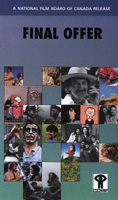Related Research Articles

The National Film Board of Canada is Canada's public film and digital media producer and distributor. An agency of the Government of Canada, the NFB produces and distributes documentary films, animation, web documentaries, and alternative dramas. In total, the NFB has produced over 13,000 productions since its inception, which have won over 5,000 awards. The NFB reports to the Parliament of Canada through the Minister of Canadian Heritage. It has bilingual production programs and branches in English and French, including multicultural-related documentaries.

Georges-Henri Denys Arcand is a French Canadian film director, screenwriter and producer. His film The Barbarian Invasions won the Academy Award for Best Foreign Film in 2004. His films have also been nominated three further times, including two nominations in the same category for The Decline of the American Empire in 1986 and Jesus of Montreal in 1989, becoming the only French-Canadian director in history whose films have received this number of nominations and, subsequently, to have a film win the award. For The Barbarian Invasions, he received an Academy Award nomination for Best Original Screenplay, losing to Sofia Coppola for Lost in Translation.
Roman Kroitor was a Canadian filmmaker who was known as a pioneer of Cinéma vérité, as the co-founder of IMAX, and as the creator of the Sandde hand-drawn stereoscopic 3D animation system. He was also the original inspiration for The Force. His prodigious output garnered numerous awards, including two BAFTA Awards, three Cannes Film Festival awards, and two Oscar nominations.
Cynthia Scott is a Canadian award-winning filmmaker who has produced, directed, written, and edited several films with the National Film Board of Canada (NFB). Her works have won the Oscar and Canadian Film Award. Scott is a member of the Royal Canadian Academy of Arts. Her projects with the NFB are mainly focused on documentary filmmaking. Some of Scott's most notable documentaries for the NFB feature dancing and the dance world including Flamenco at 5:15 (1983), which won an Academy Award for Best Documentary at the 56th Academy Awards in 1984. She is married to filmmaker John N. Smith.
Don Owen was a Canadian film director, writer and producer who spent most of his career with the National Film Board of Canada (NFB). His films Nobody Waved Good-bye and The Ernie Game are regarded as two of the most significant English Canadian films of the 1960s.
Boyce Richardson, was a journalist, author and filmmaker.

Final Offer is a Canadian film documenting the 1984 contract negotiations between the United Auto Workers Union (UAW) and General Motors. Ultimately, it provided a historical record of the birth of the Canadian Auto Workers Union (CAW) as Bob White, the head of the Canadian sector of the UAW, led his membership out of the international union and created the CAW.
Tony Ianzelo is a Canadian documentary director and cinematographer.

Village of Idiots is a short animated comedy based on the classic humorous Jewish folk tales about the Wise Men of Chełm, directed and animated by Eugene Fedorenko and Rose Newlove, written by John Lazarus, and produced by the National Film Board of Canada (NFB). Fedorenko is the Academy Award-winning animator of the 1979 NFB short Every Child. In 1999, it was one of four films in the 1st Annual Animation Show of Shows.

Lipsett Diaries is a 2010 short animated documentary film about the life and art of collage filmmaker Arthur Lipsett, animated and directed by Theodore Ushev and written by Chris Robinson. The 14-minute film was produced by the National Film Board of Canada in Montreal, where Lipsett had worked from 1958 to 1972, before committing suicide in 1986. The film is narrated by Xavier Dolan.
John N. Smith OC is a Canadian film director and screenwriter.
John Spotton C.S.C. was a Canadian filmmaker with the National Film Board of Canada.
John Kemeny was a Hungarian-Canadian film producer whom the Toronto Star called "the forgotten giant of Canadian film history and...the most successful producer in Canadian history." His production credits include The Apprenticeship of Duddy Kravitz, Atlantic City, and Quest for Fire.

Albert Kish was a Canadian documentarian/filmmaker.
Sitting in Limbo is a 1986 Canadian docudrama film directed by John N. Smith. Developed through interviews and improvisational work with a group of Black Canadian youth in Montreal, the film stars Pat Dillon as Pat, a young woman who moves in with her boyfriend Fabian after getting pregnant.
Saverio "Sam" Grana is a Canadian television and film producer and screenwriter, most noted for the film Train of Dreams and the television miniseries The Boys of St. Vincent.
The Masculine Mystique is a Canadian docufiction film directed by Giles Walker and John N. Smith and released in 1984.
Grierson is a 1973 documentary directed by Roger Blais for the National Film Board of Canada (NFB). It won, among other awards, the 1974 BAFTA Award for Best Documentary.
Do Not Fold, Staple, Spindle or Mutilate is a 1967 Canadian short drama film, directed by John Howe for the National Film Board of Canada.
The 4th Canadian Film Awards were presented on April 27, 1952 to honour achievements in Canadian film.
References
- ↑ "Looking at society with the eye of an outsider: For John N. Smith, movies have always been 'serious stuff'". The Globe and Mail , March 24, 1989.
- ↑ "John N. Smith's Welcome to Canada". Cinema Canada , November 1989. p. 23.
- ↑ "Festival Frenzy and Other News". Montreal Gazette , July 28, 1989.
- ↑ "Film festival to focus on NFB". Toronto Star , August 2, 1989.
- ↑ "Rundown on the Genie hopefuls". Edmonton Journal , February 14, 1990.